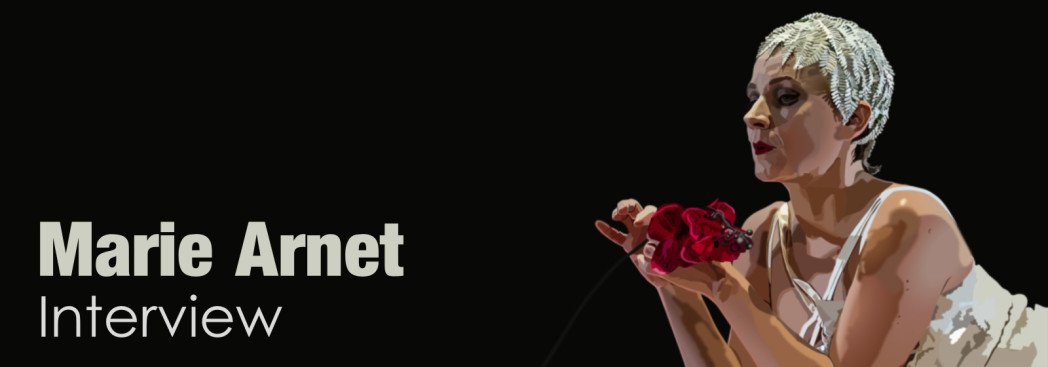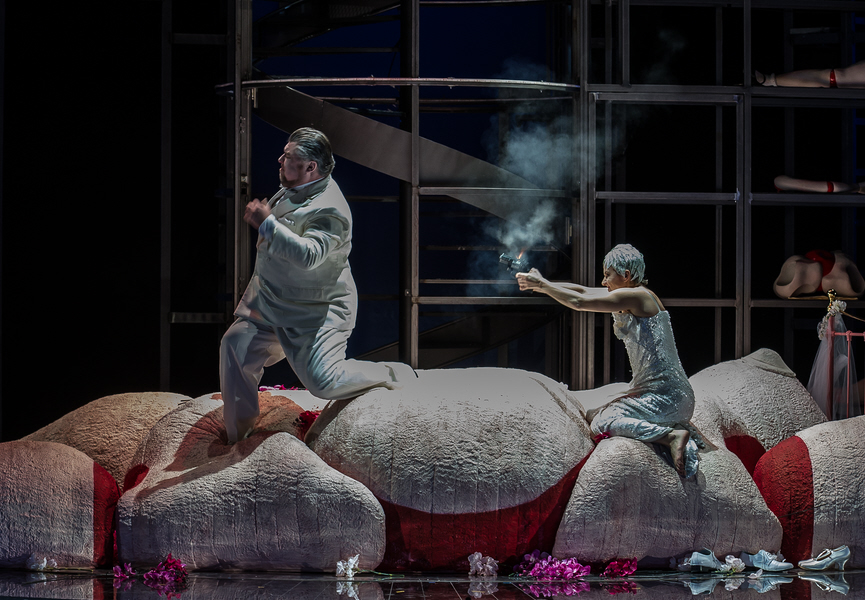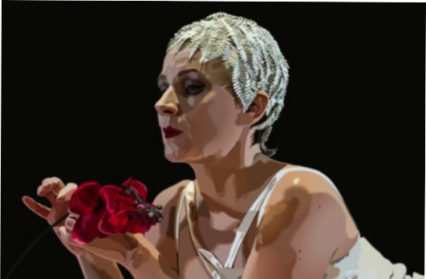Soprano Marie Arnet was born in Sweden and studied at the Royal Academy of Music in London and at the National Opera Studio. Her repertoire spans ancient and modern. Recent operatic appearances have included Eurydice in Gluck’s Orphée et Eurydice, and Pamina and Despina in Mozart’s Die Zauberflöte and Così fan tutte respectively, as well as Harey in the world première of Detlev Glanert’s Solaris at the Bregenz Festival. Amongst many other roles, she has also appeared as Mélisande in Debussy’s Pelleas and Mélisande and Sophie in Richard Strauss’s Der Rosenkavalier, and is now winning critical acclaim for her performance as the central character in Alban Berg’s Lulu in a significant new staging for Welsh National Opera by Artistic Director David Pountney, conducted by Lothar Koenigs.
Lulu is one of the most challenging roles in the entire operatic repertoire and Marie spoke with Steph Power about that and about the ambiguous nature of Lulu herself the day before opening night at the Wales Millennium Centre. The production runs in Cardiff until 23rd February before touring to Birmingham, Llandudno, Southampton, Milton Keynes and Plymouth.
Steph Power: Marie, you’ve sung lots of Mozart, you’ve sung Eurydice recently and also Sophie in Strauss’s Rosenkavalier – as well as Debussy’s Mélisande – but I believe this is your first tackling of a Berg part. How are you finding it?
Marie Arnet: Well, it’s been probably the most difficult thing I’ve done so far! You always say that when you start learning a part but I had such little time to learn Lulu [two and a half months!] and I have cursed poor Alban Berg so many times for making it so difficult! Having said that, when you arrive at the end result of course you know it is the work of a genius. But he is a control freak and everything – even the pistol shots – have to be done in tempo. He even wrote a complete set of diagrams showing where people are supposed to be on stage at particular moments – it’s in the score – it had to be structured how he wanted! It’s so perfectly done that you can see why, but it does leave you feeling slightly straitjacketed at times.
Do you think that feeling relaxes as you get into the production?
Marie Arnet: I think it already has, yes. You learn to live with it and to trust that there’s a reason why he did it that way. It’s a bit like working with a director; you may not initially agree with his ideas but if you trust him – or her – you will go with it because you know there’s a reason. And so I do trust Alban Berg in that sense and yes, it just takes a bit of time to let it sink in I think.
Technically it’s a tremendously varied role isn’t it, with lots of different weights of voice needed.
Marie Arnet: Yes – I mean, who did he write that for?! I also think there is a problem in that Berg didn’t finish the opera, because I think if he had had time to finish it, he would have revised it. Not necessarily the tessitura but the whole structure of the opera because it feels imbalanced – Act 1 is no longer than Act 2 but it feels longer and slightly schizophrenic – as opposed to Act 3 which almost feels like a different opera. I mean you recognise the music but vocally it’s in a completely different tessitura and it feels like a different part.
The ending of Lulu is controversial; Friedrich Cerha made the completion that’s been standard until recently and WNO opted to use Eberhard Kloke’s new version of Act 3 for this production. But vocally, that first scene of Act 3, the Paris scene, has always been tremendously difficult because of the thickness of the textures and the chaotic ensembles I believe?
Marie Arnet: Yes, it’s absolutely mad – a cacophony of voices really! But also I think Berg would have revised the first two acts to match Act 3 had he lived. I mean Acts 1 and 2 are perfect in their own right, but I think if he had finished Act 3, he would have looked over the whole thing. Because, if you think about how he intended the opera to be a mirror piece, at the moment it’s going to here [makes a peak] then somehow it drizzles down at the end. Act 3 should in a sense balance Act 1, but it really doesn’t. Not musically, not vocally, it’s just not the same and has a different drama.
All the big set pieces, if you like, for Lulu’s character are in the first half of the opera.
Marie Arnet: Yes, the most difficult is Act 1.
That’s where you have Meines Mannes, which is spoken. That in itself is interesting because that’s the first time we hear Lulu actually say who she might be.
Marie Arnet: Yes, she gives a glimpse of herself and the relationships she might have. It’s weird – every time she’s with Dr Schön, they argue. They never have a scene where you see the loving connection; she says at the point she kills him that he’s the only person she’s ever loved, but you wonder what kind of a relationship they have. You only see the arguments – and actually all the romantic stuff is with Alwa. All their music together is really lush and romantic – although I don’t think she’s in love with Alwa! – but with Schön, they’re fighting all the time. She’s very ironic, very sarcastic with him.

Credit: Clive Barda
Do you think Lulu means to shoot Schön?
Marie Arnet: Well, in this production, no. I think Lulu lives from her instincts and I think it’s a question of survival – if it’s him or her then it will have to be him. But I don’t think it’s something that she’s planned – the shooting comes out of him being really threatening towards her and, boom, there she goes.
To some, Lulu’s a myth, or perhaps a symbol of womanhood, and all agree she’s extremely complex. How do you see her as a character?
Marie Arnet: I think we all have a bit of Lulu in us. I think she’s a mirror – and not just for women but for men as well. Through her people see themselves – whether they like it or not – and then act from that. In a way, in her company you will be what you decide to be. But perhaps Lulu also shows you what she decides you should see of yourself; and if that’s something you don’t like, then you’ll take it out on the mirror as it were – you’ll smash the mirror.
We also view Lulu very much through the other characters’ eyes. Do you think that affects the way that the audience reacts to her?
Marie Arnet: Do you know, it’s so weird with this role, because I have no idea about the way I come across! With most roles you know whether you’re playing the bad or the good girl and you know where you belong in the drama. With this role I have no idea! Is the audience going to think Lulu’s a complete bitch? Are they going to feel for her, are they going to think she’s just cold or are they going to think that there’s something in there that could be human – I have no idea!
She’s totally ambiguous isn’t she?
Marie Arnet: Yes!
And not just going from one pole to the other, but inhabiting the extremes at the same time.
Marie Arnet: Yes! That’s why I can understand that people think she’s more of a myth than an actual human being – because it’s so complex. For me, she reminds me of Mélisande; like Mélisande, you’re not quite sure where she’s coming from, you’re not quite sure what she’s been through. When I started looking at the role, I had all sorts of images of Lulu; what she’s been through, why she is the way she is. Then I arrived here and the production didn’t reflect that at all – but actually, that can be another world of Lulu. She can be so many people depending on what situation you put her in. So I don’t know whether it’s up to the audience then to decide for themselves – I don’t think Lulu herself can show you who she is.
In terms of the vocal part, do you find it very wordy?
Marie Arnet: Oh God, it drives me insane! All the romantic, Alwa scenes are very lush; fantastic scenes, Straussian in their tessitura, lovely. All the scenes with Dr Schön are vocally quite difficult you know, sitting high and then low – it’s an argument so she’s in the extremes. And you have also Schigolch, where Lulu’s part moves in semi-tones – impossible to find the pitch! – and quite a lot of text. And then there are some scenes, like the scene with the Marquise, which just go on and on and on! The problem is it’s so well constructed with the mirror symmetry that you can’t make many cuts. But much of the dialogue doesn’t do anything for the drama! – There’s no, why are they here? Why do they want to say this at this point?
Do you feel that that’s somehow part and parcel of how Berg conceived the vocal writing, working together with the orchestra?
Marie Arnet: Maybe. But sometimes you’ll find every single note playing in the orchestra, except your own! That means you’ll hear all the notes around yours, so trying to find your own note in that is hard! I think he does write well for the voice, so I would say that although it’s not easy to sing, it’s less hard than you might think at first. But I wonder if Berg was more focused on the orchestra – the sound, the images and the colours.
Berg’s pupil Theodor Adorno saw Lulu as being an instrument herself, like a flute. His theory was that Berg had, in a way, given Lulu a part like an instrument in order to show that she was literally an instrument of the people around her. What do you make of that?
Marie Arnet: That’s interesting, that makes sense. Because you could do anything with an instrument like that – and it would fit into the way the music is different, depending on what person she’s with; like with Schigolch, in semi-tones always going chromatically quite fast. Yes I can see that.
Schigolch’s music seems to permeate the whole opera.
Marie Arnet: Yes – and seems to start in the middle of nowhere pitch-wise and end up in the middle of nowhere and you’ve no idea whether you’re in the right place or not! It’s actually more difficult to sing those kinds of semi-tones than it is to sing in leaps between pitches.
Is there any particular part of it that you really enjoy vocally?
Marie Arnet: All the Alwa music! I find that gorgeous and it just sits well in the voice – it’s just in the right place.
People often refer to the coloratura in the Lied der Lulu but there doesn’t seem to be a great deal of it.
Marie Arnet: No, there isn’t really any coloratura. There’s some ‘twiddling’ but I wouldn’t call that coloratura. The way Berg’s written it, because it’s so incredibly fast, I think it has to be seen more as ornamentation than coloratura. It’s so quick that you can’t actually hear every single note – my metronome has been my best friend for the past three months!
It’s very intriguing that we don’t actually see Lulu’s murder do we – so we don’t see her beginning and we don’t actually see her end – we hear the shriek but we don’t actually see it.
Marie Arnet: He couldn’t bear to kill her off!
That on the one hand, and on the other she’s killed off when she should be in her prime.
Marie Arnet: Yes and in a way he’s doing her a favour! – She’s almost asking for it, to end it now because of her circumstances by then.
People make quite a lot of her rise and fall socially but I’ve often seen the ending of Lulu as bringing out what’s always been there from the beginning; she’s treated like a whore right from the beginning!
Marie Arnet: Again, I think you’ll find that, in the production, it feels like we’re actually going back to her first meeting with Dr Schön; that last scene re-running the first meeting between them. So I think that’s a very beautiful image because then you understand the situation she’s in; how she got there.
Right, so her story comes full circle.
Marie Arnet: Yes, it’s like a horror version of Pygmalion. In Act 1, Schön tells the Painter that he found Lulu selling flowers in the street, and I always think of Eliza who gets picked up in the same way. Obviously Lulu’s story doesn’t end positively, but I think she has the same ambitions – but, somehow, she overdoes things because, once she gets to the top, she’s so desperate to hold on to that status. You know if you’re born into money you never have to prove that you belong in that society but if you come from underneath, you’re always going to have to prove your worth. And she goes too far.
How do you see Lulu as an opera for today. Is it still relevant?
Marie Arnet: Yes, and I think it can be seen by anybody, but you have to be prepared to be challenged – that goes for everyone. Everyone in this show is challenged by it – the orchestra, the conductor, the singers, the stage crew – we’re all challenged. It’s not an easy opera on any level. There’s no point where you can relax. It’s full-on all the time – and it must be tiring for the audience too because there are so many questions, so much you can ask yourself. But then, that’s interesting as well! If you go home from a show and have all the answers, then what’s the point really? Though I don’t know if that’s what people seem to want – the whole package with the answers!
Quite often I think they do!
Marie Arnet: They want the easy way I think! In terms of the story, is it relevant today? It is, in that it’s about humanity, it’s all about how we see ourselves and how we relate to ourselves. Actually, because I had to think about the character and where she was coming from, I’ve been thinking a lot about women and about how women are viewed and are treated in society – because the subject is quite raw at the moment. It still happens – that little girl who was shot in the head because she said we want education for women.
Which is what Geschwitz pleads for at the end of the opera –
Marie Arnet: Yes. We sat discussing this and someone said, what are they so afraid of these men? What is it in women that is so dangerous that you have to quiet them by violence and by oppression? What’s so dangerous? What can we do? It’s the same thing – what can Lulu do when she seems to drive men so crazy that they behave like they do in this opera? And what drives men to rape or to buy prostitutes? So, yes, in that sense the opera is still valid today with those questions. They’re very very hard questions!
And she’s very young isn’t she?
Marie Arnet: Yes and a lot of young girls are being abused and used still today. And it’s quite frightening and it’s stuff that you don’t want to think about and actually this opera has really brought up some of those subjects and, you know, it’s really uncomfortable. I was raised in Sweden – you know we’re supposed to be the equal society – so I’d never questioned the fact that I can do what I want, never doubted my freedom – but what would you do if you were in Lulu’s situation?
Lulu literally gets squeezed into that corner doesn’t she – where she has no choice. She’s pushed and pushed.
Marie Arnet: Then she has a gun in her hand – what’s she going to do? Is she going to kill herself? I don’t think so. What’s the choice? She has to kill Schön. And in that sense I think the opera – if you dare to look that far, if you dig deep down below the surface – the subject is raw, really raw, still today.
Marie, thank you very much for talking with me and best of luck for the performances.
Banner illustration by Dean Lewis












